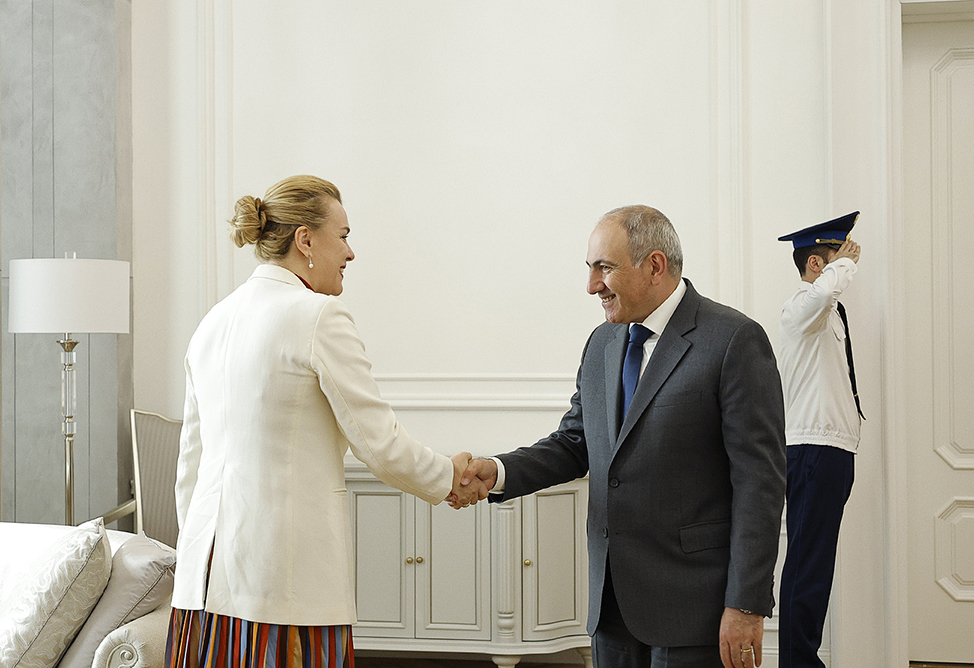Bagrat Asatryan: Armenia should enlarge its food reserves
25.08.2010,
19:09
Armenia should enlarge its food reserves, Bagrat Asatryan, director general of Garni Invest Universal Credit Organization and former chairman of the Central Bank of Armenia, said Monday at a news conference.
YEREVAN, August 24. /ARKA/. Armenia should enlarge its food reserves, Bagrat Asatryan, director general of Garni Invest Universal Credit Organization and former chairman of the Central Bank of Armenia, said Monday at a news conference.
In his opinion, the recent developments connected with fluctuation in world prices for grain will add troubles to Armenia.
“Armenia is not competitive in the region - insufficient domestic output, cuts in areas under crops and limited alternative deliveries are driving domestic market prices up,” Asatryan said.
He finds the present food reserves in Armenia scant and thinks that the unsolved Karabakh problem and the blocked transportation links aggravate the matter.
The expert is convinced that Armenia can resist challenges by enlarging food reserves.
As another step should be taken to avoid volatility at domestic grain market, Asatryan pointed out the necessity to liberalize the grain import market in Armenia and put an end to the monopoly that gives room for unjustified price hike.
“It’s not imports that triggered the recent rise in grain and flour prices in Armenia, since after certain fluctuation in the beginning of this year and 15-to-20-percent price hike in July things in world grain markets were put right, and grain prices went about 10 percent down in the recent two weeks” he said.
Despite this, flour prices in Armenia have leapt 20 to 25% to AMD 11,000 per bag over the period between August 1 and 7.
More than that – the double fall recorded over the period between 2008 and Jan 2010 at the world market produced absolutely no effect in Armenia, Asatryan said.
Vardan Ayvazyan, chairman of Armenian National Assembly’s economic committee, doesn’t share Asatryan’s opinion and sees no need to replenish food reserves.
He told journalists that the country’s reserves are sufficient to cater for essential strategic needs.
Explaining the precipitous surge in grain and flour prices in Armenia, the lawmaker said economic entities, pending imminent price hikes in world markets, acted this way to secure their interests.
He said that the antitrust agency has already embarked on an appropriate study.
Armenia imports grain mainly from Russia. These imports cover only 30% of domestic demand.
Some 315,600 tons of Russian grain have been brought to Armenia over the period between July 2009 and June 2010 against 327,900 tons imported from July 2008 to June 2009.
Armenia consumes 650,000 to 720,000 tons of grain, of which 4305,000 to 450,000 tons as food.
Armenia produces 168,000 to 175,000 tons, and the deficit is filled by imports (380,000 to 420,000 tons every year in the last five years).
The mounting prices for imported grain that drive also flour and bread prices up prompted the State Commission for Protection of Economic Competition to launch own monitoring.
Russian Prime Minister Vladimir Putin, concerned over the drought that raged this year in Russia, issued a decree imposing temporary restrictions on wheat, corn and flour exporters.-0-
In his opinion, the recent developments connected with fluctuation in world prices for grain will add troubles to Armenia.
“Armenia is not competitive in the region - insufficient domestic output, cuts in areas under crops and limited alternative deliveries are driving domestic market prices up,” Asatryan said.
He finds the present food reserves in Armenia scant and thinks that the unsolved Karabakh problem and the blocked transportation links aggravate the matter.
The expert is convinced that Armenia can resist challenges by enlarging food reserves.
As another step should be taken to avoid volatility at domestic grain market, Asatryan pointed out the necessity to liberalize the grain import market in Armenia and put an end to the monopoly that gives room for unjustified price hike.
“It’s not imports that triggered the recent rise in grain and flour prices in Armenia, since after certain fluctuation in the beginning of this year and 15-to-20-percent price hike in July things in world grain markets were put right, and grain prices went about 10 percent down in the recent two weeks” he said.
Despite this, flour prices in Armenia have leapt 20 to 25% to AMD 11,000 per bag over the period between August 1 and 7.
More than that – the double fall recorded over the period between 2008 and Jan 2010 at the world market produced absolutely no effect in Armenia, Asatryan said.
Vardan Ayvazyan, chairman of Armenian National Assembly’s economic committee, doesn’t share Asatryan’s opinion and sees no need to replenish food reserves.
He told journalists that the country’s reserves are sufficient to cater for essential strategic needs.
Explaining the precipitous surge in grain and flour prices in Armenia, the lawmaker said economic entities, pending imminent price hikes in world markets, acted this way to secure their interests.
He said that the antitrust agency has already embarked on an appropriate study.
Armenia imports grain mainly from Russia. These imports cover only 30% of domestic demand.
Some 315,600 tons of Russian grain have been brought to Armenia over the period between July 2009 and June 2010 against 327,900 tons imported from July 2008 to June 2009.
Armenia consumes 650,000 to 720,000 tons of grain, of which 4305,000 to 450,000 tons as food.
Armenia produces 168,000 to 175,000 tons, and the deficit is filled by imports (380,000 to 420,000 tons every year in the last five years).
The mounting prices for imported grain that drive also flour and bread prices up prompted the State Commission for Protection of Economic Competition to launch own monitoring.
Russian Prime Minister Vladimir Putin, concerned over the drought that raged this year in Russia, issued a decree imposing temporary restrictions on wheat, corn and flour exporters.-0-



